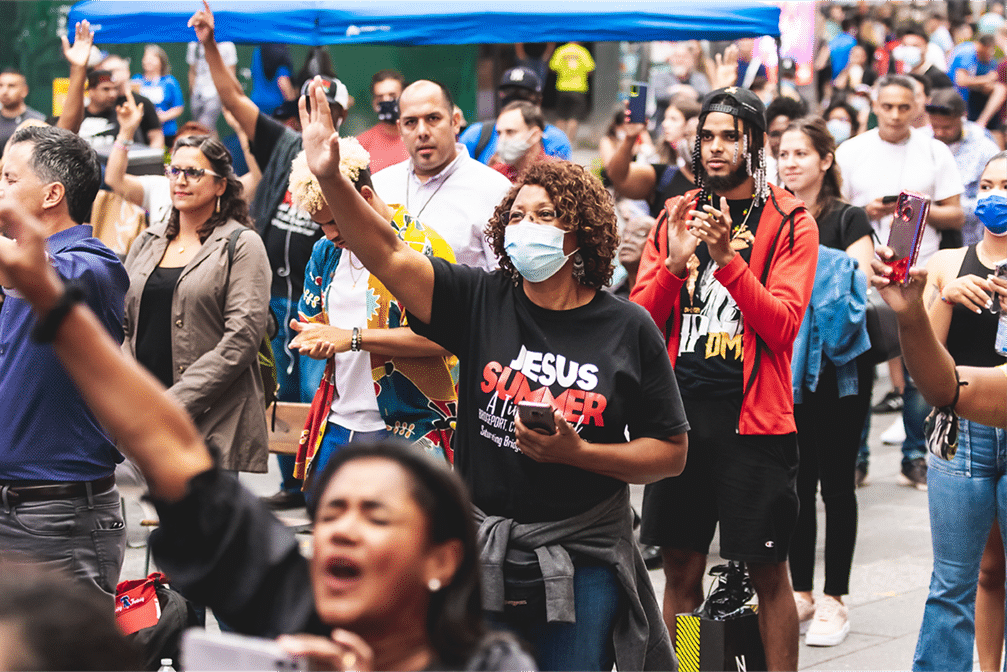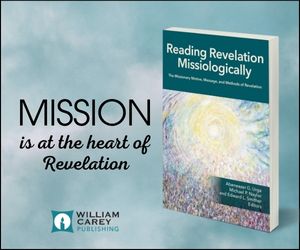EMQ » July – Oct 2024 » Volume 60 Issue 3

New York City: City residents join in worship during a concern on Times Square as part of the Jesus Week Movement. The movement has mobilized thousands of churches to work together to saturate New York City with the gospel. Photo courtesy of Urban Hope.
Special Article Preview
This article of Evangelical Missions Quarterly (EMQ) is a publicly accessible preview. Join Missio Nexus or subscribe to get access to all articles!
Multicultural Mission
Summary: In the last century, monocultural mission became fertile soil in which seeds of colonial domination too often sprouted. Let’s ask God to crucify our pride, our fears, and all other concerns so that we can step out of our comfort zones and become true ambassadors of Christ who initiate and cultivate interracial and intercultural healing.
By Mimsie Robinson and Bob Fetherlin
The richer the diversity of those cooperating in Christian mission, the stronger the sense that the gospel is rooted in God’s eternal kingdom, not in the temporal kingdoms of this world. When multicultural expressions of mission trump our monocultural tendencies, the watching world takes notice. It forces the question, “How can this be?”
In the first century the gospel spilled over Jewish boundaries to all peoples. As Peter declared to Cornelius: “God does not show favoritism but accepts people from every nation [ethne] who fear him and do what is right” (Acts 10:34–35). What was then a small stream has become a torrential river of the transformative power of Jesus Christ for those who repent and believe, regardless of ethnicity!
When I (Mimsie) met Bob and found out about his professional, academic, and missional accomplishments, I thought, “He will be a good person to serve as a mentor.” As we continued interacting, I realized that he wasn’t looking for another person to disciple, but a lifelong friend and brother. That helped me put my guard down so we could have critical conversations about Blacks and Whites in America.
These courageous and transparent conversations are a crucial building block to establishing authentic interracial relationships. They purify hearts and set minds free to establish deep heart-to-heart friendships which are unfettered by the complicated racial history of America. Too many have allowed fear to limit the diversity of our relationships and gospel partnerships.
Jesus calls all who follow him to engage in his mission. Yet in the 1980s and ’90s, I (Bob) participated in a monochromatic mission effort in Africa. It was 96% White people on mission for Christ among Africans. Globally this same missionary-sending organization had a similar profile: almost exclusively Whites being sent on mission to many nations. Why was this so monochromatic? What would it take for it to become much more colorful?
Seeking to answer these challenging questions, God orchestrated a strategic connection with a Black spiritual leader, Mimsie, who was in love with Jesus and passionate about his mission. Working with others, Mimsie helped plant a church among African immigrants living in New York.
We’ve spent quality time together over the past twenty years and have become true brothers in Christ. My life and understanding of the mission of Christ have been greatly enriched by interaction with my friend, Mimsie. Together we have been exploring how to grow multi-ethnic cooperation in Christian mission, especially among Blacks and Whites.
We live in a world where Blacks and Whites often find themselves clashing and crashing rather than cooperating and collaborating. In the church, as Black and White Christians, we usually settle for a polite civility which is neither dramatic or spiritually dynamic. It might be best termed a quiet dissonance which falls miserably short of the level of love which Jesus called his disciples to display to the world (John 13:34–35).
We all seem to get it on some level when it comes to loving people cross-culturally on a mission trip or even, possibly, during long term mission assignments. It seems to fit the job description, but how well do we love when crossing the racial line apart from our duties? Here are some key components of what it will take to live out colorful cooperation.
Seeing the Great Commission Through Two Different Lenses
We asked 25 Black Christian leaders and 25 White ones what biblical passage best expressed the mission of Christ? Most Blacks pointed to Luke 4:18–19 while Whites almost exclusively cited Matthew 28:18–20. Why this difference?
Among Whites, many examples exist of primary emphasis being placed on believing the gospel, leading to spiritual transformation. While the shared view among believing Blacks and Whites is that this is essential and that faith without works is dead, Blacks want to see and experience what Jesus declared in Luke 4. This is a desire for healthy emphasis on deeds, on the social dimensions of the gospel: preaching good news to the poor, proclaiming freedom for the prisoners and recovery of sight to the blind, releasing the oppressed (biblical justice) and proclaiming the year of the Lord’s favor.
“We, as Black people, are raised as a community. White people are raised as individuals,” explained Pastor Adrian Reeves, CEO of the National African-American Missions Council. This assertion can help us understand why a trend in the history of White-dominated Christian mission has been a very strong emphasis on proclamation of the gospel. From Billy Graham’s start in ministry in the 1940s into the early 1970s, his focus was an individual, verbal gospel. Then in 1974, he and John Stott convened a group of evangelical leaders in Lausanne, Switzerland, where they drafted a manifesto that included these words:
Because men and women are made in the image of God, every person, regardless of race, religion, color, culture, class, sex, or age, has an intrinsic dignity because of which he or she should be respected and served, not exploited. Here too we express penitence both for our neglect and for having sometimes regarded evangelism and social concern as mutually exclusive.
Some White Christian leaders viewed this embrace of the social gospel as a move in the wrong direction, a compromise of biblical truth. Simultaneously many leaders of color celebrated it, believing it was long overdue. Today Samaritan’s Purse is locked at the hip with the Billy Graham Evangelistic Association in living out this 1974 declaration. They are “two ministries, one heart,” impacting people worldwide through the individual gospel inextricably linked with the social gospel.
E. Stanley Jones articulated this well, “An individual gospel without a social gospel is a soul without a body, and a social gospel without an individual gospel is a body without a soul. One is a ghost, the other a corpse.” For many Blacks, they sniff a ghost in many White-dominated mission structures which keeps them away. Predominantly White mission entities desirous of colorful cooperation must embrace a holistic gospel reflecting the truths of both the Matthew 28 and the Luke 4 passages, realizing both are essential.
This global, holistic mission is a huge and compelling why. And “if the ‘why’ is big enough, people will come together,” declared Pastor Darnell Harper of New York’s New Covenant Temple. For maximum impact for Christ among all peoples, Blacks and Whites must join in colorful cooperation in carrying out his mission in both its individual and social dimensions.
Slay the Elephant in the Room
While leadership skills are essential, they are eclipsed by Christ-like character. Godly leaders are to “do nothing out of selfish ambition or vain conceit, but in humility consider others better than ourselves … looking not only to our own interests, but also to the interests of others” (Philippians 2:3–4). Our attitude is to be the same as that of Christ Jesus.
What does this attitude look like? We make nothing of ourselves, taking the very nature of a servant. We humble ourselves, asking God to widen our margins of grace with others, and become obedient to death – even death on a cross (Philippians 2:5–8)! Two words summarize how this attitude is to be lived out: humbly and selflessly.
Contrast this attitude with the elephant of subtle, prideful superiority based on skin color. When a predominantly monochromatic mission organization bows either knowingly or self-unaware at this altar, they are trying to “be like God” by imagining themselves as superior.
George Kelsey articulates this well: “The racist presumes to procure life by his own power, to live from the self rather than from God. [Therefore], racism is life ‘according the flesh.’ It presumes that man has his life at his own disposal, and also the lives of other men if they are members of out-races.”
Detection of ethnic superiority in mission organizations can be difficult. While it’s not usually found in policy manuals, this elephant can hide in leaders’ hearts and find subtle expression in structures and long-held practices. They point back to the political and economic power and underlying greed historically expressed in colonialism and slavery. Sadly, in too many mission structures greed and even exploitation have been, in the words of Kelsey, “blasphemously sanctified.” To our detriment, they have been tolerated.
When institutions, even churches and mission agencies, live out supremacy of one race over another using political and economic power to sustain it … with the same fervor as they would Christian teaching, we have bowed before an idol. Characterized by greed, pride and exploitation leading to the misuse of power to dominate others, we have embraced an idolatrous ideology, racism.
This idolatry manifests itself in interpersonal relationships. “The racist, who is also a Christian, says in effect to the out-race person, ‘Meet the criteria which I prescribe and relate to me on precisely the terms which I dictate and I will love you,’” Kelsey explained.
He continued: “Racism is interposed … the terms of meeting are not love but power and submission. The neighbor never comes to be regarded as a member of God’s universal community of creation or the Body of Christ. When Christian institutions tell Black members or visitors that they can come – with these proscriptions, to only say approved words, in a certain manner – you can be sure racism is interposing.”
Kelsey’s words cannot be dismissed by righteous, Christ-adoring leaders, regardless of their pigmentation. Furthermore, similar ways of thinking have often been exported by missionaries to other peoples around the world. This calls for introspection, integrity, a willingness to humble ourselves, and repentance leading to change.
This is about looking deeply into our own hearts. For colorful cooperation to develop, the elephant in the room, pride, must be slain and replaced by authentic humility. Self-centeredness, an expression of our fallen state, must be put to death. This surrendering and breaking process, superintended by the Holy Spirit, prepares us for his infilling. When he comes, so does the agape love of Christ. This humble, self-giving love must flow from our core. It is the foundation of righteous leadership and serves as a powerful antidote to ethnic superiority and racism. Upon this foundation God can construct colorful cooperation!
Bonds That Block Bullets
In our interviews with Black and White Christian leaders, a common theme emerged: Colorful cooperation is rooted in long term and high-trust relationships between godly Black and White leaders. Through these interpersonal connections, we enter into one another’s worlds. We learn to listen to each other not just with our ears, but with our hearts.
Intimidation and trepidation fade so that honest, revealing conversations can take place. Questions often muted by fear can be asked. Blind spots can be seen and graciously addressed. Vulnerability with one another grows and understanding at a deep level is nurtured. This can only happen when righteous leaders across the color spectrum invest in knowing and loving one another, enabling dividing walls to be understood and dismantled. Over more than two decades, this has become very personal for the two of us.
Our experience is a microcosm of strategic efforts to bring Blacks and Whites together at a more macro level. One expression of this is the Reconciliation Fellowship, a group of Black and White believers using technology to come together. Whites are participating in Black Sunday school sessions online thanks to Rickie Bradshaw, a Black brother and Don Allsman, a White one, growing a high-trust relationship.
For many Reconciliation Fellowship participants, this has been transformational. Another is the Table of Brotherhood initiated by the National African-American Missions Council. It brings Black and White believers together to talk about issues of race and ethnicity from the Kingdom-of-God perspective.
Neither of these involves tokenism or one-off discussions. Rather in a spirit of genuine partnership, participants engage for the long haul. It’s in these settings that colorful cooperation can be effectively nurtured.
Repeatedly, Black and White leaders interviewed indicated that the best examples of colorful cooperation have deep relational roots. High-trust relationships provide the opportunity to break down barriers.
“The church tries to hide and disguise it, but there are strongholds that people believe are true. Until we deal with them, they will always be the invisible wall that divides us,” explained Pastor Darnell Harper. This wall must come down. It is demolished by the power of prayer, bringing divine intervention to destroy it. And it is not likely to be built again when there are solid relationships strong enough to block bullets between Black and White leaders.
Embrace One Another as Equal Partners
The big brother – little brother comparison wasn’t helpful between Cain and Abel. It divided them, leading to murder. The idea of one being stronger, more mature, richer, and even better than the other remains a poisonous paradigm hindering colorful cooperation today. Instead, can we embrace one another as equals before God and in carrying out his mission?
“Blacks participating in missions do not want to be perceived as inferior. We do not want to be perceived as stumbling along. We want to be perceived as equal partners. Sometimes having more money or experience in the missional space can cause Whites to treat Blacks as if they are not on the same tier …,” said Bishop Carlton Brown of Bethel Gospel Global Assemblies International.
His words emphasize the vital importance of valuing one another as equals in mission. Yes, there may be differences between Blacks and Whites in styles, philosophy, cultures, perspectives, and approaches. Our enemy wants these to keep us separated, even divided. But must these differences divide us? Must they position one to look down on the other, subtly communicating inferiority?
Not in God’s kingdom. Paul expressed this clearly, “You are all children of God through faith in Christ Jesus … you are all one in Christ” (Galatians 3:26, 28).
Pastors Darnell Harper and David Beidel embrace being equal partners in urban mission. Built on a strong relationship, they discovered they shared a common passion for introducing people to Jesus. They moved from viewing one another as ethnically different to embracing one another as brothers in Christ. From this foundation, they experienced colorful cooperation in a cross-city, cross-state, cross-country vision called the Jesus Week Movement.
It has spread from Philadelphia to New York City to Chicago and Jacksonville. Working together on a level playing field, Black and White believers saturate entire urban zip codes with the Good News of Jesus, inviting people to follow him. Recently several more zip codes in metro New York have been added. This cooperative work would not have happened without seeing and valuing one another as equal partners.
Becoming True Ambassadors of Christ
In the last century, monocultural mission became fertile soil in which seeds of colonial domination too often sprouted. Too frequently an accompanying prideful, dominating spirit led to one ethnicity subjugating another. When this spirit shows up in our thinking and practice today, we’re going backwards. Moving in this direction is about regression, not kingdom progress.
Wouldn’t it be interesting if the racial and ethnic diversity of our closest friends became one of the ways that missions agencies evaluate the readiness of a candidate for cross-cultural assignment to a field? Probably, most of us have played it safe in the realm of Black and White relations. No one wants to be called out for making a racially insensitive or even, racist comment, but we might be playing it too safe.
Love is risky business and that is why they crucified Jesus! Let’s ask God to crucify our pride, our fears, and all other concerns so that we can step out of our comfort zones and become true ambassadors of Christ who initiate and cultivate interracial and intercultural healing. The time has come for us to break our own racial strongholds by seeking diverse Kingdom partnerships with others. Our clarion call is to kingdom advancing, colorful cooperation in mission!
Lord of all, forgive us for racial and ethnic pride in all its subtle and destructive expressions. By your power at work within us, keep us from sowing seeds of division which lead to a harvest of bitter fruit. Give us eyes to see the power of colorful cooperation in carrying out your mission, all of Christ for the whole person for all the world … every tribe, tongue, nation and people. May our hearts be filled by your Spirit with your self-giving love to live this out … for your glory and in the name of Christ our Lord, AMEN.

Mimsie Robinson (mimsierobinson@bethelga.org) is the missions pastor of Bethel Gospel Assembly in New York City, Pastor Robinson has been involved in many disciple-making efforts, locally and globally. In 2019, he earned a doctorate in applied intercultural studies from the Assemblies of God Theological Seminary. He and his wife, Beverly, have two married adult children, Michelle and David, who are both followers of Christ. They also have many spiritual children.

Bob Fetherlin (bfetherlin@onemissionsociety.org) served as One Mission Society’s president from 2014–2022. Since stepping down from that role, he has helped coordinate Billion Global (www.billion.global). He is passionate to see everyone have the opportunity to know and follow Jesus and grow into reproducing disciples in Christ-centered communities of faith. Having previously served in West Africa, Bob has been involved in leading Christian mission efforts with The Christian and Missionary Alliance and One Mission Society.
[1] Matthew 28:18–20, Luke 4:18–19. [1] “The Spirit of the Lord is on me, because he has anointed me to preach good news to the poor. He has sent me to proclaim freedom for the prisoners and recovery of sight for the blind, to release the oppressed, to proclaim the year of the Lord’s favor” (based on Isaiah 61:1–2). [1] “All authority in heaven and on earth has been given to me. Therefore go and make disciples of all nations, baptizing them in the name of the Father and of the Son and of the Holy Spirit, and teaching them to obey everything I have commanded you. And surely I am with you always, to the very end of the age.” [1] From an interview with Pastor Adrian Reeves of the NAAMC, conducted on December 12, 2023 by Mimsie Robinson. [1] Lausanne Covenant, point 5 entitled “Christian Social Responsibility,” https://lausanne.org/content/covenant/lausanne-covenant#cov. [1] Lizzy Long, “Two Ministries, One Heart: Samaritan’s Purse Volunteer Adds Role as Billy Graham Chaplain,” Billy Graham Evangelistic Association, April 29, 2019, https://billygraham.org/story/two-ministries-one-heart-samaritans-purse-volunteer-adds-role-as-billy-graham-chaplain/. [1] E. Stanley Jones, The Unshakable Kingdom and the Unchanging Person (Nashville: Abingdon Press, 1972), 40. [1] From an interview of Pastor Darnell Harper of New Covenant Temple, conducted by Mimsie Robinson on November 17, 2023. [1] George Kelsey, Racism and the Christian Understanding of Man (New York: Charles Scribner’s Sons, 1965), 73. [1] Kelsey, Racism, 147. [1] Kelsey, Racism, 148. [1] Kelsey, Racism, 148. [1] “Reconciliation Fellowship,” Completion Global, accessed March 1, 2024, https://www.completion.global/reconciliation-fellowship. [1] “Team,” NAAMC Missions, accessed March 1, 2024, https://www.naamcmissions.org/team-3. [1] Pastor Darnell Harper in interview conducted on November 17, 2023 by Mimsie Robinson. [1] Bishop Carlton Brown in an interview conducted on November 21, 2023 by Mimsie Robinson. [1] “Jesus Week Movement,” accessed March 1, 2024, https://jesusweekmovement.org/.
EMQ, Volume 60, Issue 3. Copyright © 2024 by Missio Nexus. All rights reserved. Not to be reproduced or copied in any form without written permission from Missio Nexus. Email: EMQ@MissioNexus.org.









Responses